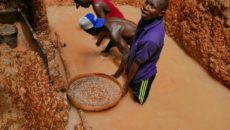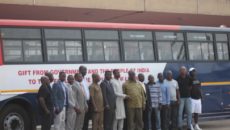On the night of Friday, April 11, Liberia’s minister of foreign affairs, C. Cecil Dennis, should have been schmoozing with Monrovia’s foreign diplomatic corps.
Instead of attending a farewell party for the ambassador of Guinea, the doyen of the diplomatic corps representing a close Liberian ally and a state heavily dependent on Soviet aid, Dennis continued to slave away with a small staff (current Foreign Minister Marjon Kamara may have been by his side) in his new office as midnight struck.
As part of Liberia’s increased international profile when it hosted the 16th annual meeting of the Organization of African Unity the previous year, Dennis was bequeathed a new building for the Ministry of Foreign Affairs.
It commanded a superb view of the Atlantic coastline during the daylight hours. Perhaps the sound of waves lapping against the shore prevented Dennis and his small staff from hearing the shootout taking place at the Executive Mansion just a few hundred meters up the coast.
He did not know it at the time, but his fate was linked to that of his president. While his president’s death remains something of a mystery, Dennis would be executed live on Liberian television just a few days later.
The official narrative of what transpired that night is that 17 low-ranking soldiers were able to successfully penetrate the Mansion’s security, reaching the building’s eighth floor, where they disemboweled the Liberian president, the son of an immigrant from South Carolina who was seen as representing the corrupt interests of an elite minority, the Americo-Liberian settler group.
However, Cecil’s brother James notes that the “Tolbert government was not very welcomed by the Americans†and that the family “attribute[s] the coup to foreign elements.â€
Cecil Dennis had made waves a few years earlier during July 4th celebrations at the U.S. Embassy when, as his brother notes, “he made very sharp remarks†criticizing the U.S.’ lack of support for Liberian development, comparing it unfavorably to the efforts of the British and French to support their West African colonies.
Despite these strains, the Americo-Liberians retained strong ties to the U.S. They educated their children in American colleges and ensured that culinary items such as potato salad, cinnamon rolls, and pineapple upside down cake became mainstays of the national diet.
Dennis’s father was close to the famed singer Nina Simone, who lived in Monrovia for a number of years in the 1970s. Cecil Dennis attended Lincoln University in Pennsylvania, which at the time, was led by the brother of the president of the University of Liberia.
As revolution brewed on that fateful night, Romeo Horton, dean of the University of Liberia’s Business School and the brains behind the creation of the African Development Bank, passed the Executive Mansion on his way home from the Guinean ambassador’s farewell party.
He initially mistook the shooting for firecrackers. But when alerted by his driver, he sped past, stopping at the adjacent Foreign Ministry to warn Dennis of what was going on. The Foreign Minister, a Georgetown University law graduate and part of a new wave of competent technocrats recruited by Tolbert to reform the government and manage the rising tensions between the settler elite and the indigenous Africans, immediately tried to reach the president on a direct line. It was dead.
He then tried a number of cabinet members on a direct, secure line. None worked. His brother, James Dennis, notes that these lines had never previously experienced such technical faults. James Dennis says that the coup makers “knew when to cut the lines. It was highly professionally done.†When asked if the 17 soldiers attributed as being behind the coup were capable of cutting the lines he responds with a forceful “no way!â€
Highly alarmed, Cecil Dennis fled toward his home in the suburbs, away from the Executive Mansion and the Post Stockade, where a number of political prisoners from the People’s Progressive Party, the first opposition political party, which had just been legalized months earlier, were held.
The PPP was led by G. Bacchus Matthews, a youthful agitator and a former employee at Liberia’s consulate in New York. He was fired for alleged financial improprieties that may have led to the dissolution of his marriage, which may be why James Dennis notes that he “wanted the Tolbert administration crushed.â€
According to James, Cecil Dennis and his family took refuge in their house, as the two brothers resided in adjacent residences. James, a newspaper publisher, was also the honorary consul for Haiti, which provided some level of diplomatic protection.
The decision to take refuge in his brother’s residence proved prescient, as, throughout the course of the night, six truckloads of soldiers visited the foreign minister’s residence, spraying it with gunfire each time.
James Dennis relays that at about 2 a.m., their neighbor, a U.S. embassy staffer, whom the family believed to be a Central Intelligence Agency operative, visited his house, announcing that there had been a successful coup and that Tolbert was dead. While the precise hour of Tolbert’s death is unknown, this timing indicates that the American was receiving extremely prompt updates on the unfolding situation.
Dennis notes that the Embassy staffer was “extremely cordial and kind.†He gave Cecil Dennis access to his home and from his phone, he called contacts at a number of Embassies to assess what level of help might be provided to him.
None, including the United States, were forthcoming. Cecil’s execution after finding temporary refuge in the American’s house later prompted a congressional inquiry on US asylum policy.
That morning, the new military government called on all high-ranking officials of the Tolbert government to turn themselves in. Confident that he had governed with integrity, Dennis decided to comply.
He was accompanied to the Executive Mansion that afternoon by two Liberian soldiers (recruited by the Embassy staffer/CIA agent) and a cousin (Max Dennis, who would become Minister of Youth and Sports under Charles Taylor) to ensure his safety. After April 12, the Dennis family would never see their American neighbor again.
James Dennis notes that upon arriving at the Executive Mansion, his brother was received by the PPP leader, Bacchus Matthews, who had been released from prison by the military government. According to Togba Na Tipoteh, another U.S.-educated Liberian progressive, Matthews “was a paid agent of the CIA, at the level of $25,000 a month.â€
Dennis was ushered to the same Post Stockade where Matthews had resided and was never seen by his family again. On the morning that his brother was executed with 12 other government officials, ten days later, James Dennis was the only member of the press corps detained while attempting to cover the press conference at the Executive Mansion. His brother was executed just down the beach – the site would have been visible from the upper floors of the mansion.
In the new military government, Bacchus Matthews was named foreign minister, succeeding Cecil Dennis. While James Dennis believes that the original coup was successful due to foreign support, he says that he doesn’t “think the American government wanted Cecil Dennis executed. I think the progressives wanted him out of the way.â€
James notes that the Dennis family is still “analyzing and looking to pinpoint who is responsible for the coup d’état.†Whoever it was, he believes that the new military government, which “didn’t know their hand from their face,†were their stooges.
And the stooges marched to the tune of Washington. In the five years following the death of Cecil Dennis, the new government received more U.S. aid than all previous Liberian administrations combined.



